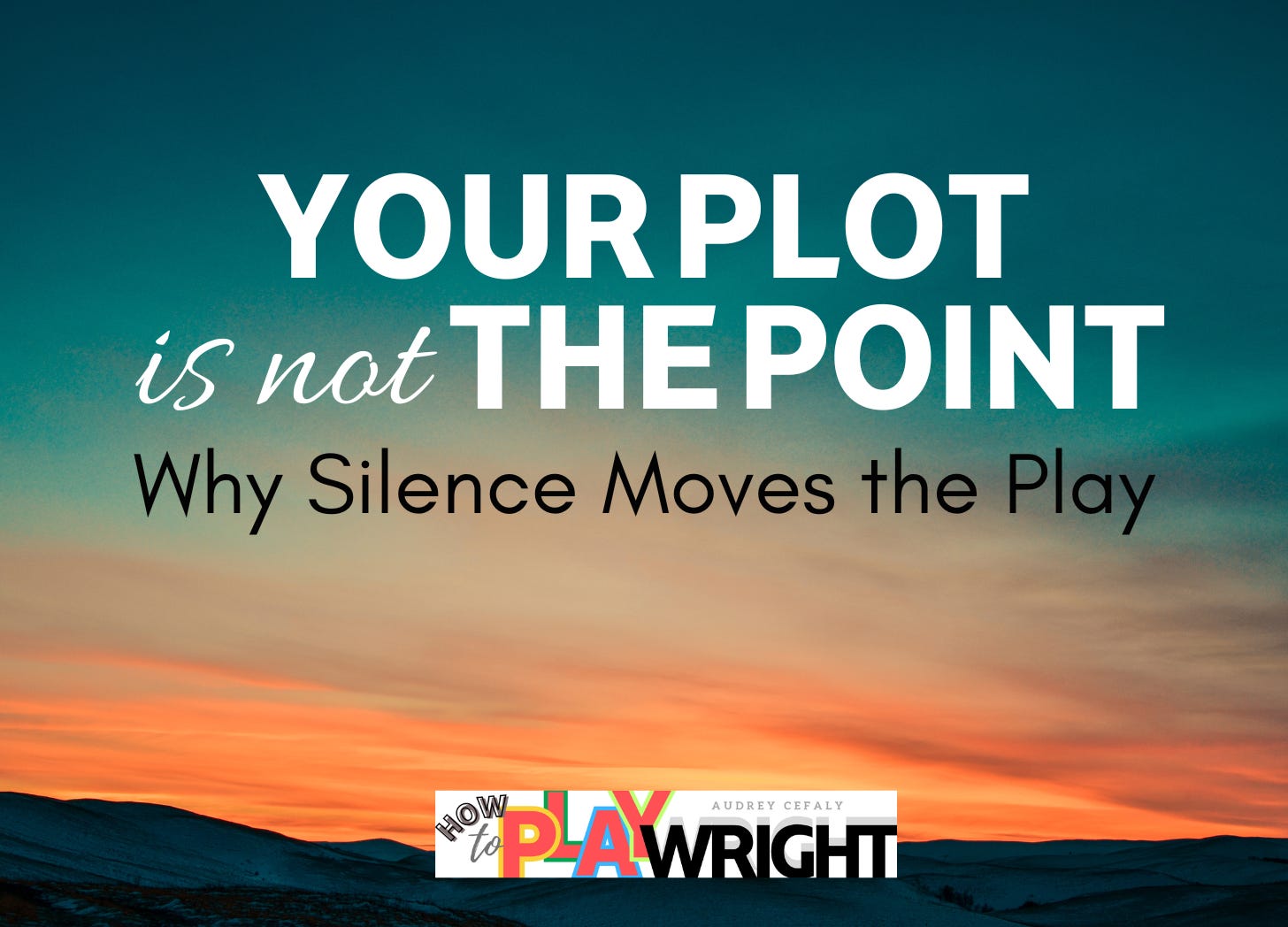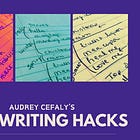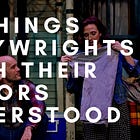Most plays aren’t about what happens. They’re about what can’t. What can’t be said. What can’t be undone. What can’t be forgiven. That’s the tension. That’s the engine.
A good play doesn’t move forward because events pile up. It moves because someone tries, and fails, to speak, to confess, to connect, to let go. It moves because a silence gets too loud to bear. Action is overrated. The real stakes—and I will die on this hill— live in what’s withheld.
Let’s break down this pileup (aka “rupture”) in my one-act FIN & EUBA:
What’s “happening”?
Euba and Fin are on a porch.
Euba is drinking.
A porch light flickers on and off (curfew warning).
Euba throws a beer can.
Euba has a panic attack.
Minimal plot. Basic action.
But that’s not where the play lives.
What can’t happen in this moment?
Euba can’t leave. She says, “I can’t… I can’t… move.” Her fear of the unknown is paralyzing.
She can’t believe there’s anything better out there—even though she knows there is. She says, “I know there’s better places, Fin. Don’t think I don’t know that.” And yet—she’s stuck. Fear outweighs fact.
She can’t accept help or comfort. Fin tells her “You are NOT stuck,” but Euba screams “OH, SHUT UP!!!!!!!!!!!!!!” because hope feels like betrayal when you’re trapped inside despair.
Most tragically, she can’t breathe—literally. Her emotional state becomes a physical crisis. She’s so locked up in her own psyche that her body revolts.
This is not a scene about movement. It’s a scene about immobility.
That’s the drama. Not what happens, but what refuses to. She’s so close to change, to possibility, to getting in the car and going. But she can’t. And we feel that. That pressure. That stuckness.
It’s not action that drives the scene. It’s resistance.
In Long Day’s Journey Into Night, the family can’t say what they all know, so they circle the truth and drown in avoidance. In A Doll’s House, Nora can’t forgive herself for waking up too late, and Torvald can’t forgive her for leaving the role he needed her to play. In Who’s Afraid of Virginia Woolf?, George and Martha can’t undo the illusion they’ve built around their grief. In Death of a Salesman, Willy can’t accept that being ordinary is enough, and Biff can’t make him see the truth. And in Doubt, the characters can’t prove what matters most, which makes the uncertainty itself the most powerful force on stage.
So when you’re stuck, don’t ask: what should happen next?
Ask: what can't happen yet?
Ask: what's impossible here?
Start there.
PAID SUBSCRIBERS GET A FREE MONTHLY STICKER!
YES, I POST SUBMISSION OPPS
https://audreycefaly.substack.com/t/submissions (bookmark this page)
PREVIOUS ARTICLES BY AUDREY CEFALY
How to Write the 10-Minute Play
This year I had the pleasure of mentoring a few dozen writers in preparation for submission to Concord Theatricals Off Off Broadway Short Play Festival. I thought I would summarize some of the advice I gave to these aspiring writers. I’d also love to hear about any techniques that work for you; feel free to comment below.
LEAN MORE ABOUT AUDREY
Visit my website for more about me and the work I do!
Audrey Cefaly's plays (Alabaster, Maytag Virgin, The Gulf, The Last Wide Open, Trouble) have garnered the Lammy Award, the Calicchio Prize, the NNPN Goldman Prize, the Edgerton, and a Pulitzer nomination. Her works have been produced at Signature Theatre, Cincinnati Playhouse, Barter Theatre, Merrimack Rep, Florida Studio, Florida Rep, Gulfshore Playhouse, and countless others. Cefaly is a Dramatist Guild Foundation "Traveling Master," an Arena Stage playwright cohort, and a recipient of the Walter E. Dakin Fellowship from the Sewanee Writers Conference. She is published by Concord Theatricals, Applause Books, Smith & Kraus and TRW.





















A MUST READ! Playwrights and screenwriters and scene makers and novelists and short story people and flash vixens, a must! It’s almost summer! Time to boost those narrative skills! We need every voice! And the silence around it...
I’m going to be sitting with this for a while - there’s something prophetic about this insight